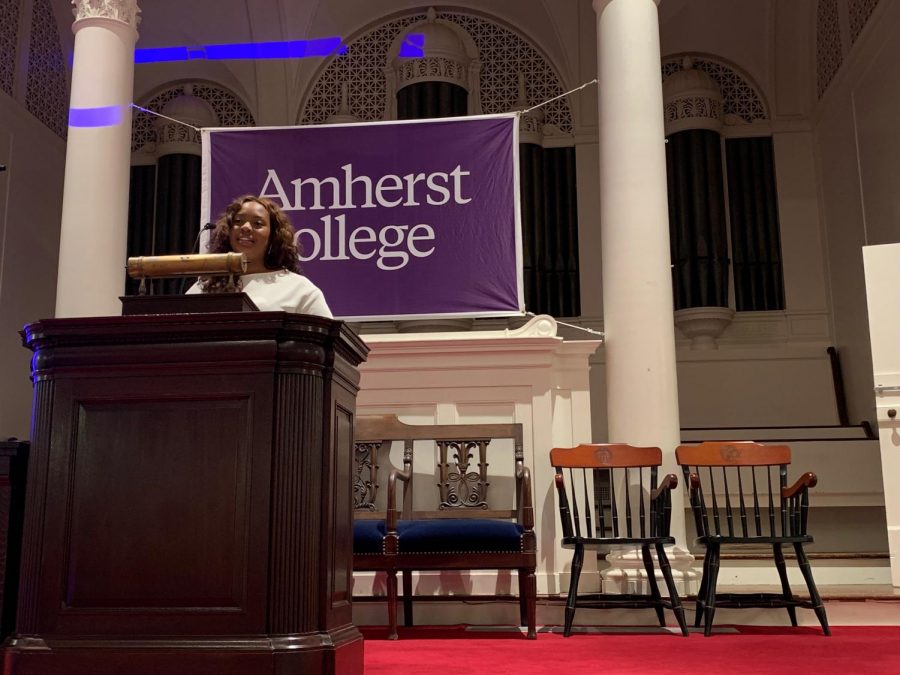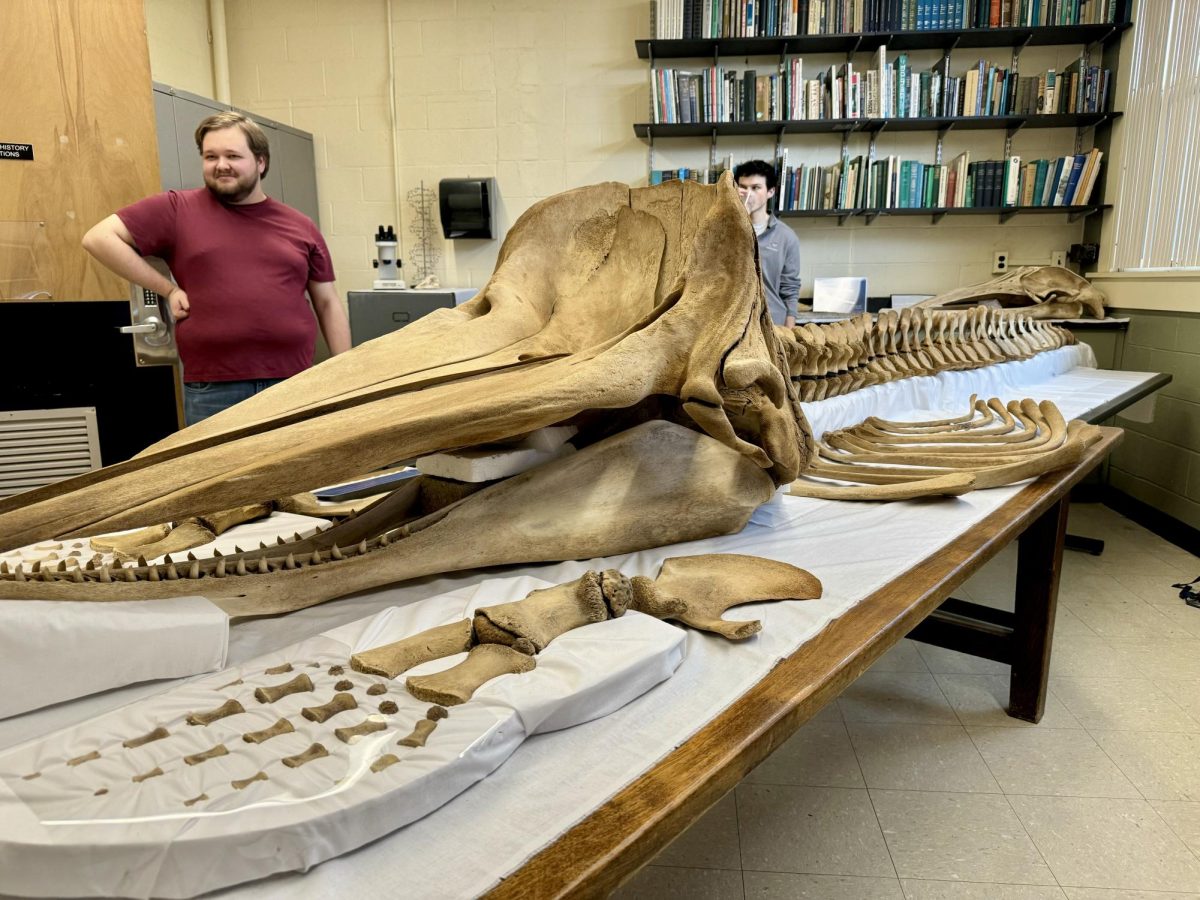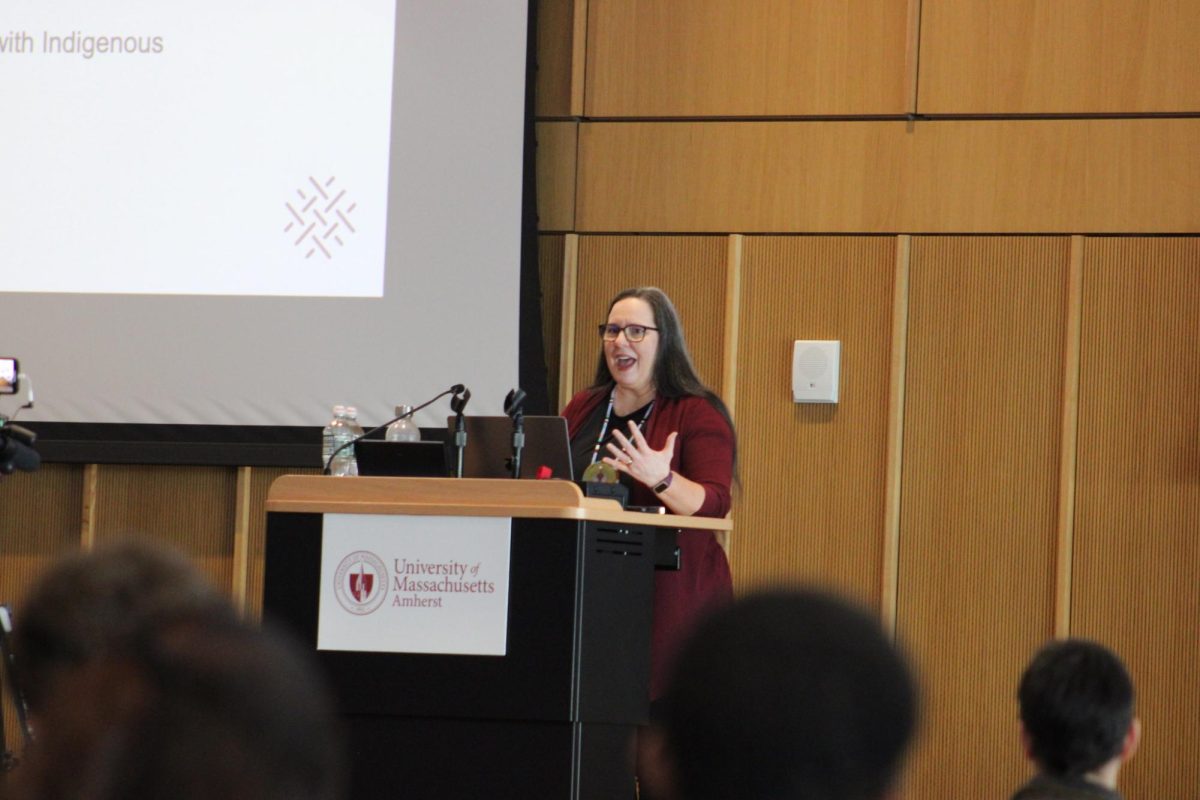On Earth Day Monday night, students, faculty and community members gathered at Amherst College to hear about the Green New Deal from key policy author Rhiana Gunn-Wright.
The event was sponsored by the Amherst College Democrats, the Office of Environmental Sustainability, the Office of Student Affairs and the Association of Amherst Students. Gunn-Wright is the policy director of New Consensus, a policy group spearheading research on green economy and other issues.
According to her, the Green New Deal, sponsored by New York Rep. Alexandria Ocasio-Cortez and Massachusetts Sen. Ed Markey, “[puts] forward an approach to dealing with climate change and income inequality that invites people in to ask questions, to contribute, but to not be the end-all be-all, and I am certainly not the end-all be-all.”
Throughout the talk, Gunn-Wright emphasized that she is still in the process of finalizing the research process for the Deal and has a goal of releasing a full policy book in early 2020.
Right now, Gunn-Wright said she is working on “identifying experts and working with them and getting them in rooms together that they have never been in because we define expertise as not just academics, not just policy blogs, but people on the front lines, activists, folks who’ve been doing this, working on these issues for a long time.”
In her talk, she discussed the current pressure to act, the economy and the environment, and how the Green New Deal aims to address both “twin crises” of climate change and income inequality.
“The next decade, it really does decide what kind of planet we will have,” she said.
After detailing the impact of fossil fuel companies and their hold on the economy, Gunn-Wright asked the audience, “when you say we justneed to deal with climate change, what does that mean?”
“That means you need to change the way that you build, it means you need to change the way you use land, it means you need to change the way that you move people and the goods, you might need to change the material which moves them…there’s really no such thing as justdealing with climate change,” she continued.
Further on the topic of the intersection of economic and environmental justice, Gunn-Wright said “climate change and equity are linked. And so, on a foundational level, there’s increasing evidence that countries with high levels of income inequality, especially rich countries, have higher emissions.”
“In environmental justice communities, where fossil fuel plants and facilities are assigned, they are called sacrifice zones because the people are treated as disposable, right…The people who bear the worst effects have the least power…they’re the people that also don’t have money and time to take off and protest…And so coal-fired power plants, pipelines, etc. – all of these are cited in areas where residents tend to be poor and of color, and lack the political power to oppose,” she said.
“If we have a green economy that is as stratified as the one we have now, we will have failed,” she said. “Because when there’s an opening this big to change the political economy, and you don’t take it, whether or not you didn’t take it on purpose, you are responsible for that. We are responsible.”
Gunn-Wright also touched on the impact the Green New Deal has on jobs, saying that policy writers had “a big emphasis on jobs…because we have to ensure that new jobs, new green jobs, can not only compete with older jobs, but can interrupt current power structures, that is empower for them favorite profits. So that’s why you see a commitment to collective bargaining agreement deal. That’s why you see a commitment to high wage jobs.”
She also addressed the common concern that the Green New Deal is trying to tackle too many big issues by saying that “good policy should try to solve multiple issues at once if it can.”
“On Earth Day, people talk a lot about how much they care about the planet. And we wanted to try and push people into moving from… why they care to what we can do to protect the Earth,” said Ben Gilsdorf, president of the Amherst College Democrats, commenting on the significance of the talk falling on Earth Day. “So there’s a lot of talking about… ‘drive your car last.’ But we’re starting to get to the point where I think little things like that aren’t going to be enough. And we really need to start thinking on a bigger scale.”
Caitlyn Simon, an intern in the Amherst Office of Environmental Sustainability, said that OES has a number of environmental-themed events planned for this week, such as a fundraiser at the College’s local affiliated farm.
“We thought that it was a really cool idea that we could kind of start off this whole Earth week with this really large, global focused event, and then kind of move toward the more local activism scene,” Simon said.
Irina Costache can be reached at [email protected] followed on Twitter at @irinaacostache.





















Unseen Force • Nov 10, 2020 at 10:20 am
From what I see, the biggest benefactors of this so-called deal are building contractors since this proposal calls for buildings to be demolished in order for them to be more environmentally friendly. I wouldn’t be surprised if a company like Bechtel or Turner Corp. is behind this deal. So much for the little people.
amy • Apr 23, 2019 at 3:23 pm
tax*
amy • Apr 23, 2019 at 3:18 pm
Lol the green new deal is idiotic and impractical. Even alot of leftists don’t support it and are embarrassed by it. It’s just socialism in the guise of caring about the “environment”..
Since most socialists live off of someone else,usually the government. How about we talk the salaries of professors, any welfare going to socialists, activists and restrict their ability to own cars and to own or rent in dwellings over a certain size?
This could lead to a huge reduction in Co2.